The Iron Man's Relentless Strides: Daniel Lee Reveals The Highs and Lows of Being A Triathlete
Daniel Lee (99/SC/Physical Education & Sports Science; 13/GS/Master of Education; 19/GS/Doctor of Philosophy in Education) is well regarded as Hong Kong's leading triathlete – the Iron Man. This accolade is due to his outstanding achievements representing Hong Kong in triathlon competitions at the National Games of China, the Asian Games, and the Olympics. Yet, Daniel's talent and endurance lie not only in triathlons, but also in learning and his academic achievements, making him one of the few professional athletes in Hong Kong with a doctorate. He is now an Associate Director of Elite Training Science & Technology at the Hong Kong Sports Institute, with a mission to train Hong Kong's top athletes for global competitions, and to nurture more elite athletes for Hong Kong. With the Paris 2024 Olympics approaching, this iron man once again ignites Hong Kong people's expectations for its competing athletes.
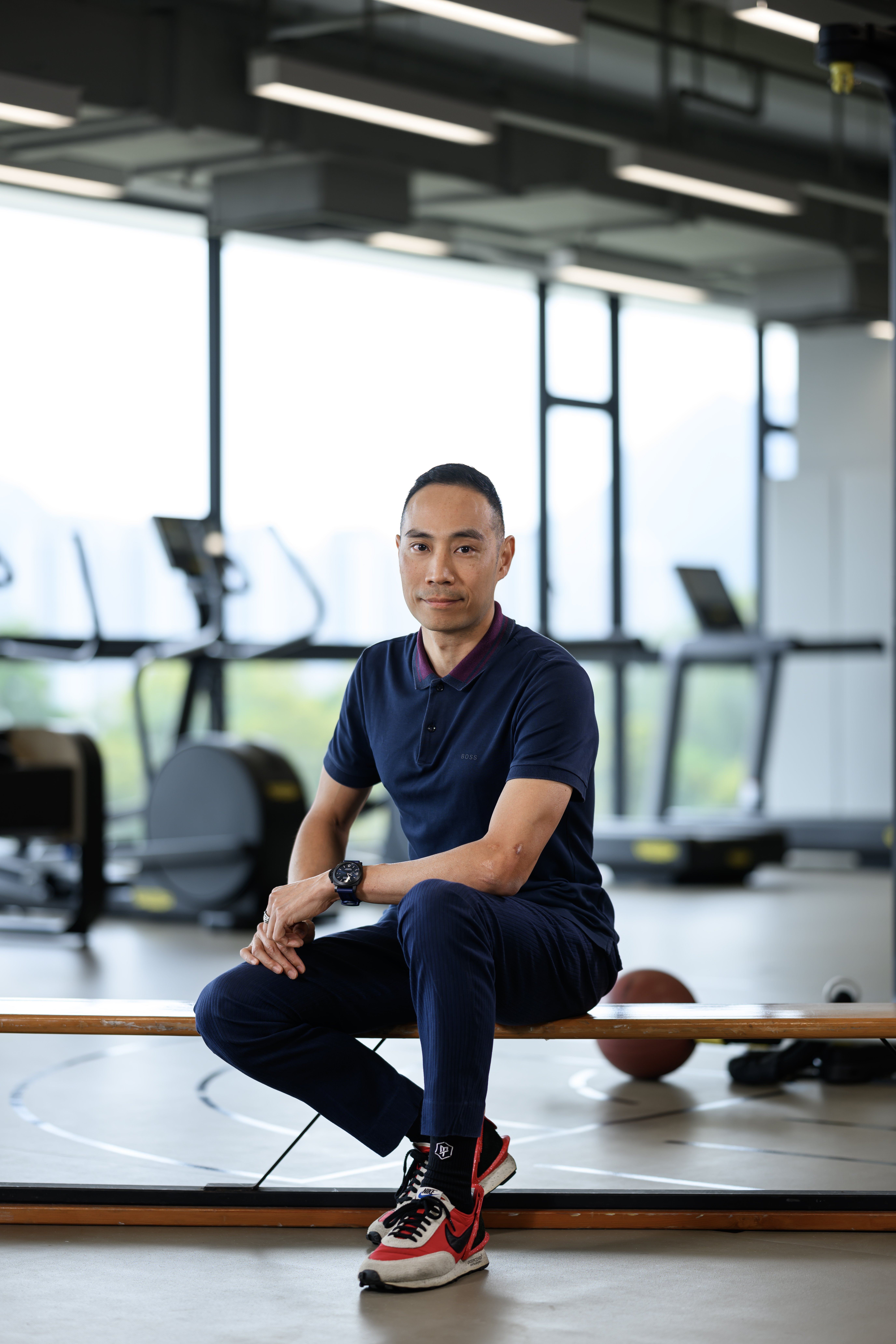
Daniel's father was a primary school physical education teacher who taught swimming after school. Daniel himself picked up swimming at the age of 7 or 8, and slowly but steadily developed his exercise habit. He said, "Besides swimming, growing up in Yuen Long, I also grew to love cycling and running. At around form 3 or 4, I started going to triathlon competitions with my swimmer friends. Initially, I participated in shorter races (400 meters running, 10 kilometers swimming, and 3 kilometers cycling). I thoroughly enjoyed all three sports and performed quite well, which sparked my interest to continue competing in triathlons. Later on, Ruth Hunt, the Hong Kong Triathlon National Team coach noticed my performance and invited me to train with the Junior Squad. This marked the beginning of my journey into triathlons."
It is a common obstacle for student athletes to juggle between academics and training, but Daniel had already mastered the art of time management. He described, "On weekdays, I trained at the swimming club in my neighbourhood, and I could only go to the Hong Kong Sports Institute in Sha Tin for training on weekends. To make up for lost time, I would cycle on an exercise bike or run in the neighborhood every morning before school. During longer breaks like Christmas or Lunar New Year, I would go to intensive sessions at the Sports Institute. With only 24 hours in a day, the key to success in triathlons is rooted in balancing training across the three sports. For example, if I was training for 30 hours a week, I would dedicate approximately 8 to 10 hours to swimming and 10 to 12 hours to cycling, leaving the rest for running. Training plans vary significantly based on the triathletes' strengths; so those stronger in swimming might allocate more time to running and cycling. This differs significantly from athletes specializing in just one of the three sports. "Another notable feature of triathlon training is to grasp the idea of a good triathlon time, so aside from the three sports themselves, the finishing time also includes the transition between swimming to cycling, and cycling to running. Daniel laughed and said, "During training, I also had to practice quick and efficient triathlon transitions, which is why I often joke that I change clothes faster than most people!"
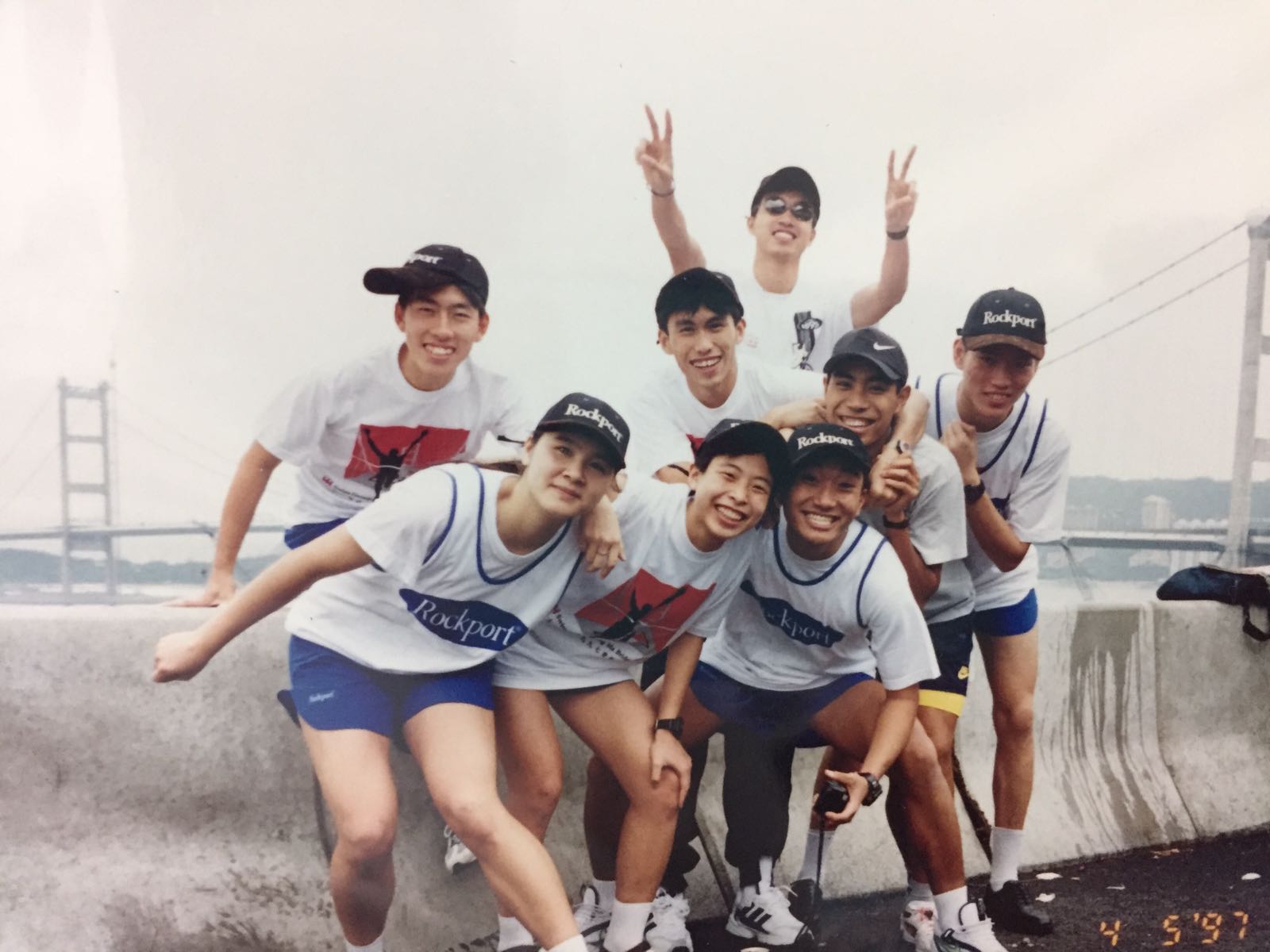
During his undergraduate years, Daniel Lee (second row, second from the right) often went out for sports activities with his classmates.
Triathlon Chose Me: Two Indelible Injuries
Many would say triathlons push athletes beyond their physical limits, to the extent where it feels like self-sabotage. Daniel, however, believes it is not just his choice to pursue triathlons; rather, triathlon has also chosen him. "For an athlete to be genuinely passionate about all three sports and have the physical fitness to excel in them is not easy. I have a passion for swimming and cycling while running came naturally to me as I seemed to be a natural runner. This has allowed me to do reasonably well in triathlons. Plus, to succeed in triathlons, you would need a great amount of endurance and discipline to take part in lengthy training sessions, which sat well with my personality. So, in a sense, it feels like this sport has also chosen me. When I had the opportunity to compete for Hong Kong, I realised that winning local competitions was one thing, but competing in international races elevates the challenge significantly. Deep down, I aspire to reach the caliber of a world-class athlete and pursue medals at major sporting events. It is this goal that drove me forward through the toughest of training sessions," Daniel said.
Throughout his career as a professional athlete for over 15 years, Daniel has experienced both highs and lows, with two particularly memorable setbacks in 2000 and 2005 because of major injuries in his legs. "Both times, it was a stress fracture in my lower leg — once in my left and once in my right. They happened because of overtraining and not taking adequate time to relax, which caused overuse on my legs leading to the fractures. I was very unhappy at the time, wondering why it had to be me. Fortunately, during my recovery, I received therapy from sports psychologists, which helped me extensively in my bounce back to intensive training and competitions. With the support of my coach, family, and teammates, I was able to rebound from these setbacks," Daniel said. He added that in his career as a triathlete, one of his largest takeaways is that even if he gives 100% of his effort, it does not always transform into a 100% return. He further explains, "Most of the time, you may even have to give 120% of your effort to only receive an 80% return. Therefore, it is paramount to aim high during training but also manage your expectations. This principle applies not just to sports but also to other professions, and it made me learn to do my best and walk the extra mile, yet focusing less on the outcomes."
Daniel chose to retire from triathlons in 2011. While some might think the timing was off with the London 2012 Olympics approaching, Daniel disagreed. He said, "Athletes participate in major sporting events in cycles. For example, after the Beijing 2008 Olympics, there was the 2009 National Games of China, followed by the 2010 Asian Games, interspersed with relevant world championships in between. After completing one cycle in 2011, I began contemplating my future. Though I was not too old to stay in triathlons, it could pose some challenges if I continued into the next cycle and only entered the job market four years later. So, I was determined to retire." He chuckled, noting that it was not difficult to leave his sport and putting his athletic identity aside; what proved challenging was changing his exercise habits. He said, "It was hard to hit the brakes on exercising given I had two to three training sessions daily for over a decade. I had this vivid memory as I was transitioning to my first full-time job at a bicycle shop in Yau Ma Tei after retirement. Living in Ma On Shan, I figured I could commute by bike and I had to squeeze in time for running. Missing a day of exercise left me feeling uneasy all over even until today. Obviously, transitioning from a professional athlete to a working professional had me feeling uncertain and confused in the beginning. Luckily, senior teammates shared their experiences, and the Athlete Affairs Department at the Sports Institute provided me with career guidance. Although not all advice aligned with my career aspiration, they at least helped me chart a course forward."
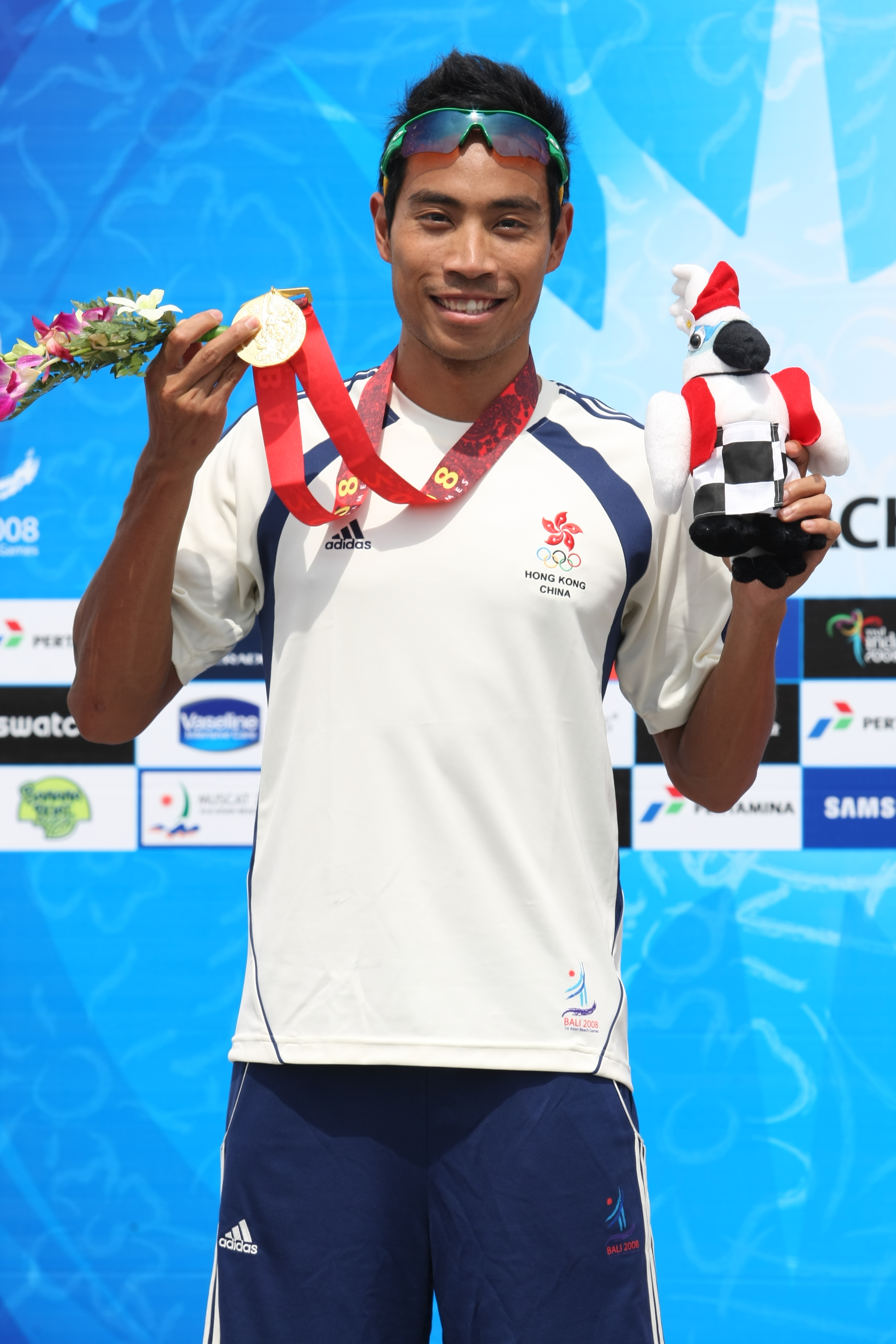
In 2008, Daniel won the gold medal in the Asian Beach Games Triathlon.
Embarking on Academic Pursuits at CUHK in 2012
After working at a bicycle shop for more than a year, Daniel transitioned to teaching at CUHK. "It was actually a coincidence. In 2012, there were two cohorts entering university simultaneously due to an education reform affecting both DSE and A-Level students, so CUHK needed to expand its teaching staff in numerous departments, and I seized the opportunity to return to CUHK to teach." In addition to becoming a teacher, he also found time to continue his studies and even started pursuing a doctoral degree. Just as disciplined and resilient in academics as in sports, he carried along his great fortitude from triathlon into his studies. He said, "Perhaps I was accustomed to training in triathlon, I became disciplined and resilient. Studying has a striking resemblance to sports, both requiring strong acumen in setting goals. Besides, I was really fortunate to have the opportunity to pursue in a doctoral degree in 2014. My research focused on the relationship between sports recovery and wearing compression garments. Coincidentally, the laboratory was right next to my office, allowing me to balance work and study effectively. I owe a lot to Professor Stephen Heung-sang Wong, the department head at the time, whose guidance allowed me to fully enjoy the pleasure of discovering new knowledge in the lab."
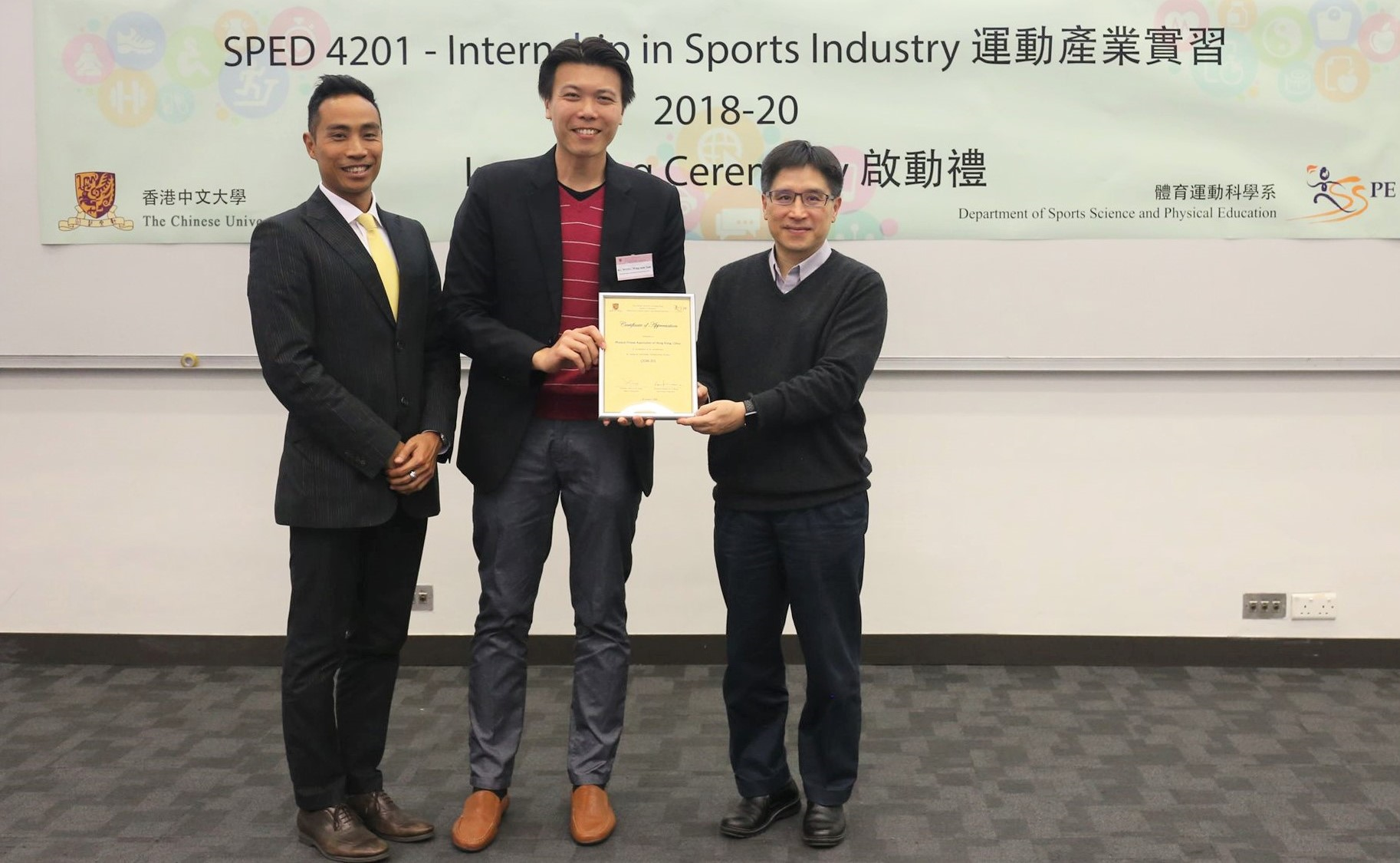
Daniel said he is most grateful for the guidance of Professor Stephen Heung-sang Wong (right) during his PhD, which led him to successfully complete his dissertation and graduate.
Daniel Lee returned to the Hong Kong Sports Institute four years ago as the Associate Director of Elite Training Science & Technology. He emphasised the consequential impact of sports science on advancing athletes' performance. "The Sports Institute offers various resources, including physical therapists, integrated manual therapy, massage therapists, and others who assist athletes in recovery. In case of injuries, we have visiting orthopedic professors to assist with treatment. Nutritionists oversee our athletes' dietary needs, and our biochemical monitoring technologies would run post-training blood tests to assess the athletes' bodily adaptation and response. Sports psychology, as I mentioned, aids athletes in preparing for competitions and performing at exceptional levels. Additionally, biomechanics utilises advanced tactical analysis, artificial intelligence, and big data to enhance athlete training efficiency. My role here is to leverage these resources to support the athletes comprehensively," Daniel said.
In 2021, the Hong Kong government and the Hong Kong Jockey Club jointly invested 300 million HKD to establish the Sports Science and Research Funding Scheme, co-managed by them. Daniel described, "On one hand, we invited universities and research institutions to collaborate and develop technologies that are beneficial to athletes, such as apps to monitor athlete training and tools to analyse our athletes' and their competitors' performances. On the other hand, we also need to procure existing technologies in the market and transform the data into strategies that our coaches and athletes can comprehend, which will in turn assist them in their training and competitions."
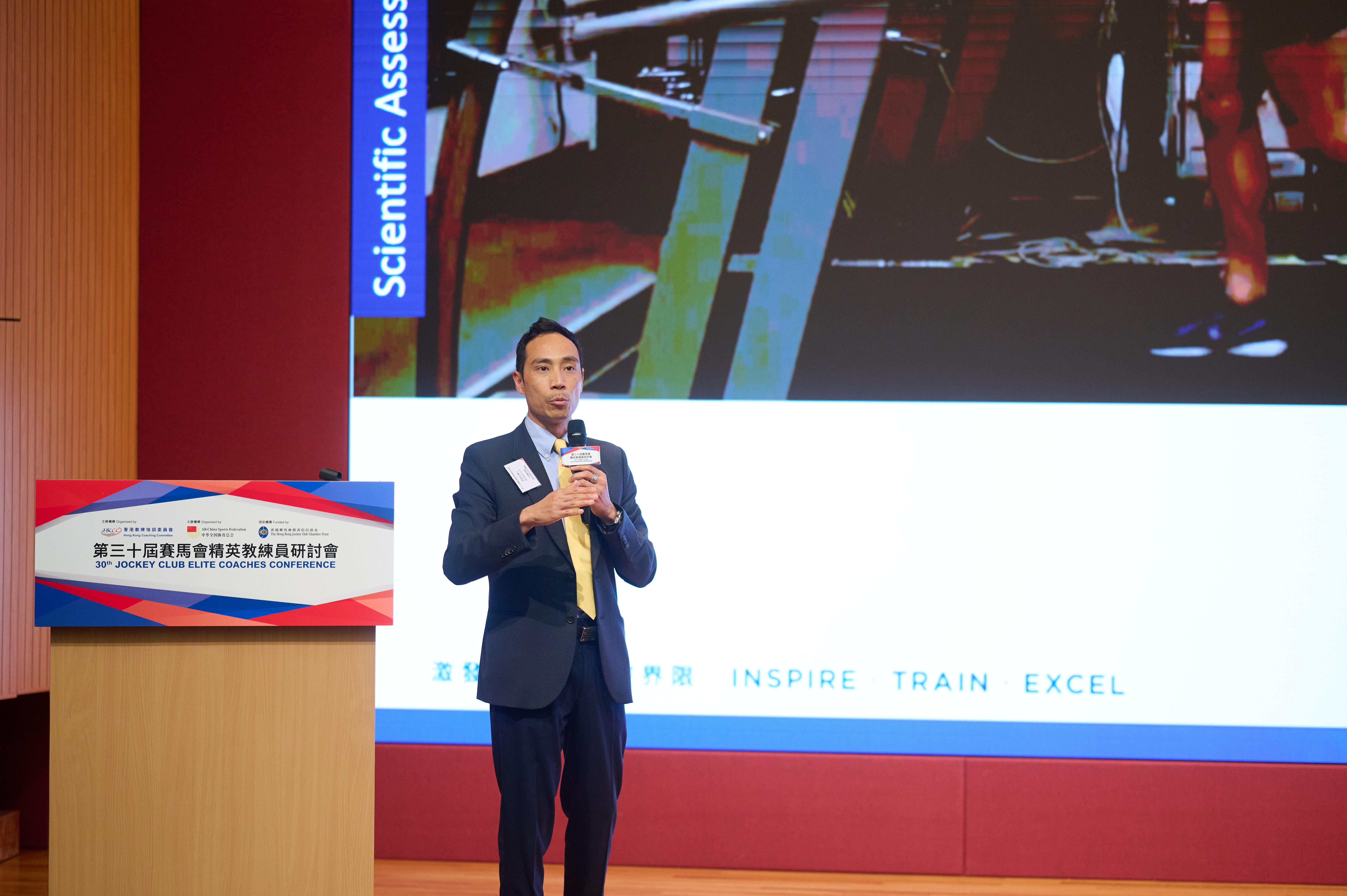
After becoming Associate Director of Elite Training Science & Technology at the Hong Kong Sports Institute, Daniel shared his experience supporting elite athletes at an international coaching conference.
Serving Alumni and Reconnecting with the College
Juggling between exercise, work and family responsibilities, Daniel Lee attributes his adept time management to his early start in sports since childhood. "When I was at university, coordinating with different stakeholders such as coaches and professors was crucial when drafting a training plan. Now, balancing work, exercise, and family involves similar communication with my superior and my family. Fortunately, my wife is very supportive and helps coordinate as much as possible. I also make sure to spend time with my family every evening after work, especially on Sundays," Daniel said. However, because of his intensive training schedule and living in the Sports Institute dormitories during his undergraduate studies, Daniel admits he did not develop a strong attachment to CUHK. He said, "Classes were mainly held in university gymnasiums or sports centres, and I rarely had the chance to return to Shaw College, so I did not feel a deep connection to the College. It was only after I started teaching at CUHK that I began thinking about how to give back to the College. I joined the Shaw College Alumni Association in 2016, and last year, I was elected president. My mission is to strengthen the connection among alumni and introduce sports to alumni activities, such as a recent sailing experience held at the end of March."
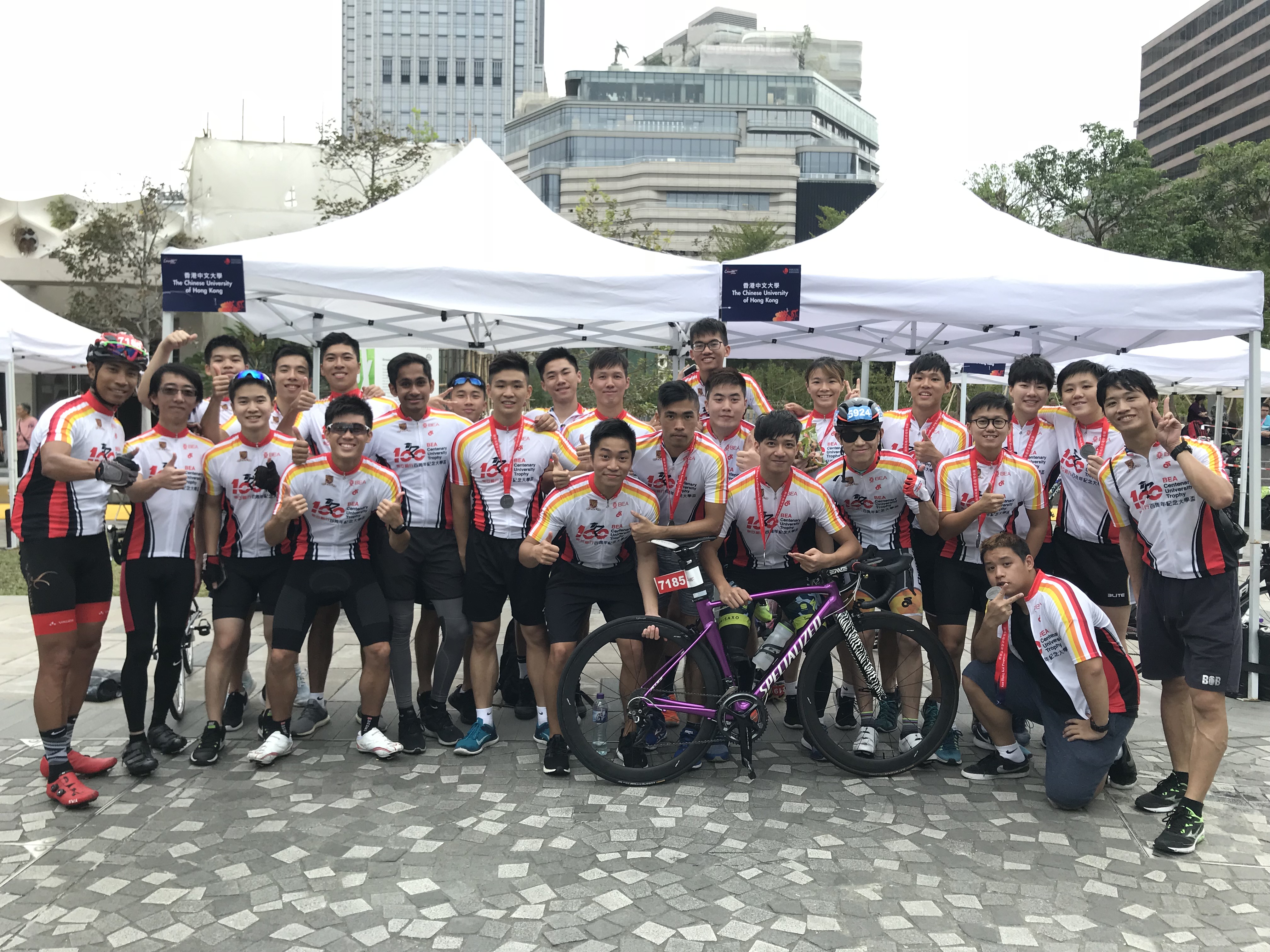
During his tenure at CUHK, Daniel (first from the left) led students to participate in the Hong Kong Cyclothon by the waterfront in Tsim Sha Tsui East.
For CUHK juniors aspiring to become professional athletes, Daniel highly recommends this career path. He said, "Unlike my time, current athletes receive a lot more support from various channels and recognition in the society, making it easier for them to pursue this career. The most important thing to note is to make full use of all available resources, but without becoming overly reliant on them. They need to be proactive and communicate with their department, especially since the University provides flexible arrangements for competitions and training. Such flexibility allows them to extend their four-year degree to up to eight years, enabling them to excel in both sports and academic endeavours."
As for the upcoming Paris 2024 Olympics, he hopes Hong Kong's athletes will achieve good results. He said, "Qualifying for the Olympics on its own is already a fantastic achievement, as it requires qualification across multiple competitions. All the athletes at the Olympics possess the best talent and physical condition, so the outcome really depends on their performance and the way they utilise their skills on the day. While we do not set medal targets, historically, we have won medals in every other Olympics: Lee Lai-shan in 1996, Li Ching and Ko Lai-chak in 2004, Sarah Lee Wai-sze in 2012, and Edgar Cheung Ka-long in 2020. If we can break the curse and win a medal this year, it would definitely be a major breakthrough!"
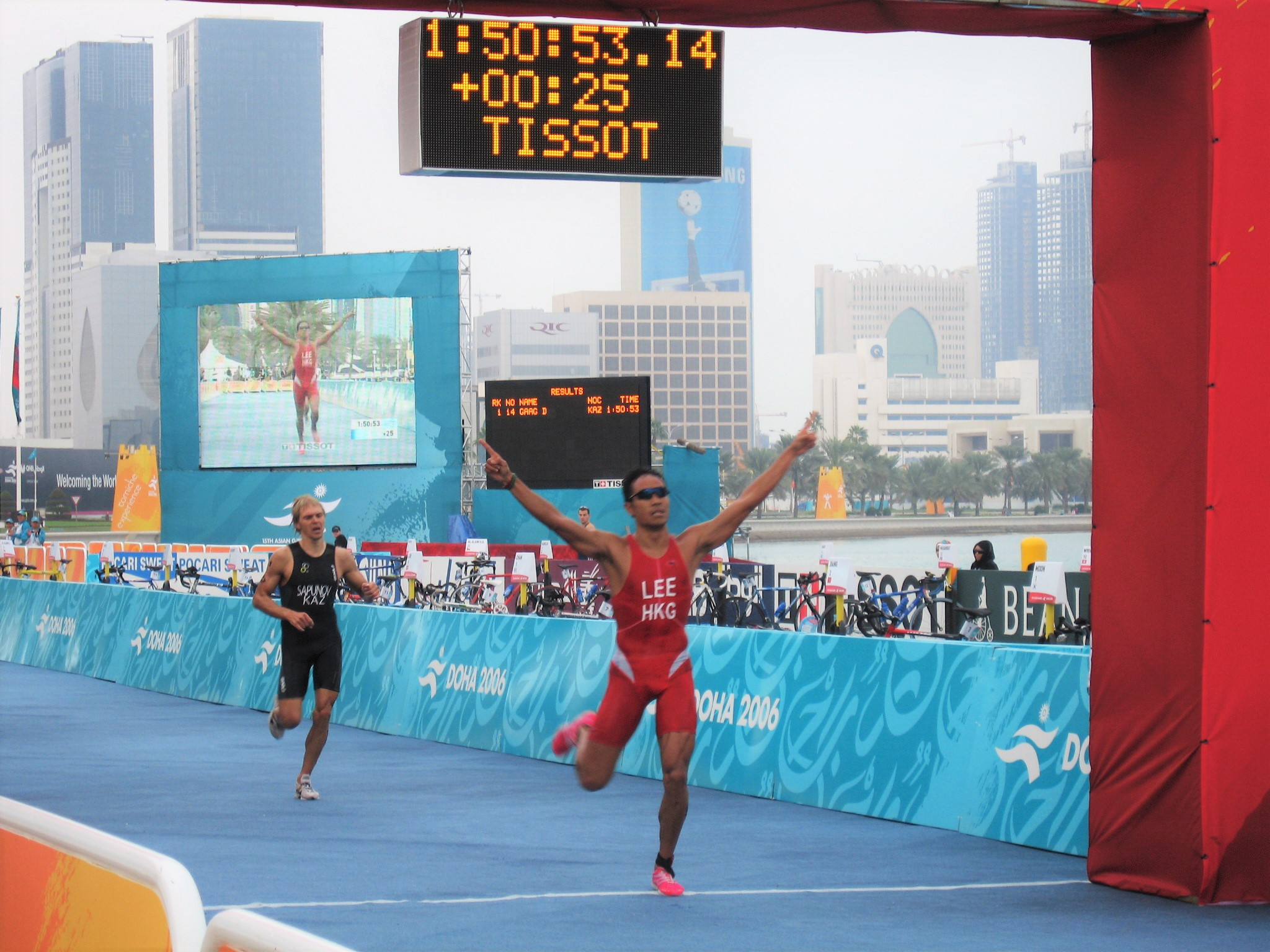
The thrilling finish that won Daniel's silver medal at the 2006 Doha Asian Games
Daniel Lee's Profile
- 1999 ‧Bachelor of Education, The Chinese University of Hong Kong
- 2004 ‧Ranked 43th in Triathlon at Athens 2004 Olympics
- 2006 ‧Silver Medallist in Triathlon at the 2006 Asian Games
- 2008 ‧Ranked 43th in Triathlon at Beijing 2008 Olympics
- Gold Medallist in Triathlon at the 2008 Asian Beach Games
- Awarded the Hong Kong Sports Stars Awards
- 2009 ‧Bronze Medallist in Triathlon at the 2009 National Games of China
- 2010 ‧Ranked 39th in ITU Triathlon World Championship Grand Final Budapest
- 2013 ‧Master of Education, The Chinese University of Hong Kong
- 2019 ‧Doctor of Philosophy in Education, The Chinese University of Hong Kong
- 2019 ‧Associate Director in Elite Training Science & Technology at the Hong Kong Sports Institute
"CU Alumni Magazine" Video Interview: https://youtu.be/HPxEqI9ieYc
Published in "CU Alumni Magazine" Issue 118 by Alumni Affairs Office 2024
Read online: CU Alumni Magazine Issue 118 (Chinese Version Only)
pdf: https://alumni.cuhk.edu.hk/en/magazine/categories/pdfversion/202406
ISSUU: http://www.alumni.cuhk.edu.hk/magazine/issuu/





